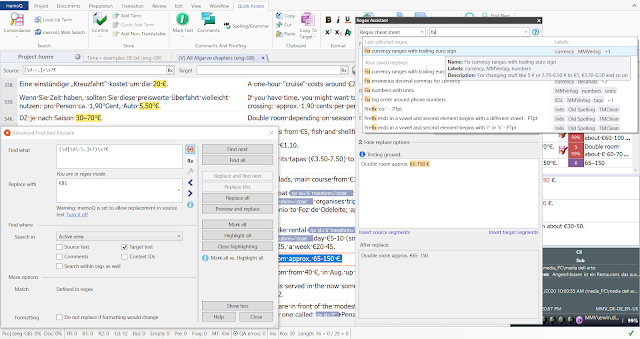A few months ago, I received a pre-release copy of this book as a courtesy from the author, terminologist Uwe Muegge, with a request to give a quick language check to the English used by its native German author. As I expected, there wasn't much to complain about, because he has lived in the US for a long time and taught at university there as well as been involved in important corporate roles. I was particularly pleased by his disciplined style of writing, the plain, consistent English of the text and the overall clarity of the presentation. Anyone with good basic English skills should have no difficulty understanding and applying the material.
At the time I read the draft, I was completely focused on language use and style, but I found his approach and suggestions interesting, so I looked forward to "field testing" and direct comparisons with my usual approach to terminology mining with that feature in memoQ. About a day's worth of tests shows very interesting potential for applying the ChatGPT section of the book and also made the context and relevance of the other two sections clearer, I will discuss those sections first before getting to the part that interests me the most.
Uwe presents three approaches:
I wouldn't really call these three approaches alternatives as the book does, because all three operate in very different ways and are fit for different purposes. That didn't register fully in my mind when I was in "editor mode", although the first part of the book made the differences, advantages and disadvantages clear enough, but as soon as I began using each of the sites, the differences were quite apparent as were the similarities to more familiar tools like memoQ's term extraction module.
Wordlist from Webcorp is functionally similar to Laurence Anthony's
AntConc or
memoQ's term extraction. It's essentially useful for getting frequency lists of words, but the inability to use my own stopword lists for filtering out uninteresting common vocabulary makes me prefer my accustomed desktop tools. However, the barriers to first acquaintance or use are lower than for AntConc or memoQ, so this would probably be a better classroom tool for introducing concepts of word frequencies and identifying possible useful terminology on that basis.
OneClick Terms was interesting to me mostly because friends and acquaintances in academia talk about Sketch Engine a lot. The results were similar to what I get with memoQ, including similar multiword "trash terms". I found the feature for term extraction from bilingual texts particularly interesting, and the fact that it can work well on the TMX files distributed by the Directorate-General for Translation (DGT) of the European Commission suggests that it could be an efficient tool for building glossaries to support translation referencing EU legislation, for example, though I expect only slight advantages over my usual routine with memoQ. These advantages are not worth the monthly subscription fee to me. However, for purposes of teaching and comparison, the inclusion of this platform in the book is helpful. I see more value for academic institutions and those rare large volume translation companies that do a lot of work with EU resources.
ChatGPT was an interesting surprise. I have a very low opinion of its use as a writing tool (mediocre on its best day, clumsy and boring in nearly all its output) or for regex composition (hopelessly incompetent for what I need, and anything it does right for regex is newbie stuff for which I need no support). However, as a terminology research tool I have found excellent potential, though formatting the results can be problematic.
My testing was done with ChatGPT 3.5, not a Professional subscription with access to version 4.0. However, I am sorely tempted to try the subscription version to see if it is able to handle some formatting instructions (avoiding unnecessary capitalization) more efficiently. No matter how carefully I try to stipulate no default capitalization of the first letter of every expression, I inevitably have to repeat the instruction after a list of improperly capitalized candidate terms is created.
I keep an e-book copy of Uwe's book in the Kindle app on my laptop, so I can simply copy and paste his suggested prompts, then add whatever additional instructions I want.
The prompt
Please examine the text below carefully and list words or expressions which may be difficult to translate, but when writing the list, do not capitalize any words or expressions which don't require capitalization.
is too long, and only the part marked red is executed correctly, but this follow-up prompt will fix the capitalization in the list:
Please re-examine that text and this time when writing the list, do not capitalize any words or expressions which do not require capitalization.
Further tests involved suggesting translations for the expressions, with or without a translated text and building tables with example sentences:
Other prompt variations, for example to write terms bold in the example sentences, worked without complications.
What about the quality of the selections? Well, I used memoQ's term extraction module on the same text I submitted to ChatGPT for term extraction in order to compare something with which I am quite familiar with this new process.
memoQ identified a few terms based on frequency, which ChatGPT ignored, but these were arguably terms that a qualified specialist would have known anyway. And ChatGPT did a superior job of selecting multi-word expressions with no "noise". It also selected some very relevant single-occurrence phrases which might be expected to arise more in later, similar texts.
 |
| Split screen review of memoQ extraction vs. ChatGPT results |
The split-screenshot is an intermediate result from one of my many tests. The overlayed red box was intended to show a conversation partner the limits of ChatGPT's "alphabetizing skill", and the capitalization of the German is not correct after a prompt to correct the capitalization of adjectives misfired. It is not always trivial to get formatting exactly as I want it. However, looking at the results of each program side-by-side like this showed me that ChatGPT had in fact identified the nearly all the most relevant single words and phrases in my text. And for other texts with dates or citation formats, these were also collected by ChatGPT as "relevant terms", giving me an indication of what legislation I might want to use as reference documents and what auto-translation rules might also be helpful.
I also found that the split view as above helped me to work my way through the noise in the memoQ term candidate list much faster and make decisions about which terms to accept. The terms of interest found in memoQ but not selected by ChatGPT were few enough that I am not at all tempted to suggest people follow my traditional approach with the memoQ term extraction module and skip the work with ChatGPT.
My preferred approach would be to do a quick screening in ChatGPT, import the results into a provisional (?) term base and then, as time permits, use that resource in a memoQ term extraction to populate the target fields in the extraction grid. With those populated terms in place, I think the review of the remaining candidates would proceed much more efficiently.
All in all, I found Uwe's book to be a useful reference for teaching and for my personal work; it is one of the few texts I have seen on LLM use which is sober and modest enough in its claims that I was inspired to test them. The sale price is also well within anyone's means: about $10 for the e-book and $16 for the paperback on Amazon. For the "term curious" without access to professional grade tools, it's a great place to get started building better glossaries and for more seasoned wordworkers it offers interesting, probably useful suggestions.
The book is available HERE from Amazon.













.jpg)








